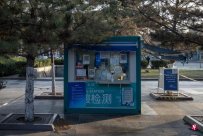Analysts believe that the sudden transition from the Chinese mainland has brought more interference to growth. The key indicators of China this week may show that the economy worsen in November and make it fall into a fragile situation.
According to Bloomberg, economists who have been investigated predict that retail sales shrinkage will be greater than October, industrial added value and investment slowly, and the unemployment rate will rise.The National Bureau of Statistics of China is scheduled to release the above data on Thursday (15th).
The epidemic, including the capital Beijing, has spread rapidly. After giving up strict testing and quarantine regulations in China, the number of cases in the next few weeks and months is likely to further increase.Numbers and deaths.
Chinese policy makers are turning the focus of next year from clearing to zero to promoting growth, and it may introduce more financial and currency.The central bank has the opportunity to increase stimulus measures when holding a monthly liquidity operation this week, but economists are expected to cut interest rates at present.
In order to better evaluate China's economic performance, the following is the part of the data that needs to be followed on Thursday.
The first is weak consumption. The number of crown virus cases surged in November. At the same time, several cities launched seal control to control the infection.Relying on face -to -face interaction retail companies may be the most impact, such as restaurants and hotels.Economists who were investigated by Bloomberg predicted that the total retail sales of social consumer goods in November will decrease by 4%year -on -year. This is the largest decline since the outbreak of the Shanghai outbreak in the second quarter, and it will only fall 0.5%in October.
Car sales is an important part of retail sales, and it is also a rare highlight in recent months. However, it was hit hard in November. According to the data of the China Passenger Federation, it fell 9.5%year -on -year.The November Shopping Festival failed to boost retail sales.For the first time, Alibaba did not disclose the complete sales results of its e -commerce platform. Previously, the prediction showed that there would be an unprecedented decline.
The second is the decline in factory activities. The manufacturing towns such as Guangzhou and Zhengzhou implemented a seal control in November to interfere with commercial activities and supply chains.Hon Hai Precision (also known as Foxconn) reported that in November, revenue fell 11.4%. Previously, the company broke out in the iPhone assembly plant in Zhengzhou, affecting shipping.
According to Economists surveyed by Bloomberg, the industrial added value in November may increase by 3.5%compared with the same period of the previous year, and the increase of 5%in October.In addition to epidemic interference, the global demand for exports has decreased significantly, and it has also suppressed China's manufacturing output.China's exports have shrunk by nearly 9%in November, the largest decline since February 2020.
Third, the investment slowly. In the case of most other growth engines, China's investment in real estate, manufacturing and infrastructure has become a greater driving force for the economy.As the government has increased support for projects, infrastructure investment in November may continue to grow strongly.In the case of continued downturn in the real estate market, property investment may still be weak, although the official has recently proposed several rescue measures for the industry.
Economists predict that fixed asset investment from January to November this this this time this may increase by 5.6%year -on -year to 5.8%below January to October.
Fourth, the unemployment rate is rising. As Chinese companies are forced to lay off, freezing recruitment, or even temporary or permanent closes, employment data is a key focus.The survey unemployment rate is maintained at 5.6%after 5.5%.The upper limit set by the government in 2022 is less than 5.5%.The survey rate of people aged 16 to 24 set a record high of 19.9% in July and maintained at a high of 17.9%.
Five is policy loans. The People's Bank of China will have the opportunity to increase support for the economy on Thursday. Previously, the bank deposit reserve ratio was lowered to inject liquidity into the market.Of the seven economists who were investigated, the four expected one -year policy loan (that is, the convenience of medium -term borrowing) of more than 500 billion yuan (RMB and approximately S $ 100 billion) in the central bank would be fully served.Back to 100 billion yuan, a net is expected to invest 300 billion yuan.
Analysts predict that after the turning of the zero policy, it has triggered the selling of government bonds and turbulent the credit market, the central bank may want to maintain abundant liquidity.
However, 14 economists who were investigated agreed that the People's Bank of China would avoid reducing MLF interest rates and maintained it at 2.75%.



